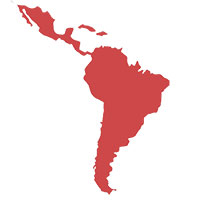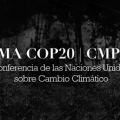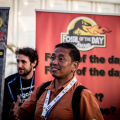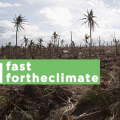Day Two at COP20 Sees Things Heat Up
Evan Weber | December 3, 2014.
It was another hot day at Cuartel General del Ejército, the military barracks where this years COP is being held. Due to a last minute venue change, many of the buildings on site have been constructed in the past six weeks and don’t have proper ventilation or air conditioning. Just like the venue itself, the negotiations are beginning to heat up.
The main event of yesterday was the Ad-Hoc Working Group on the Durban Platform (ADP) negotiations session. Country blocs gave their stance on the progress that has been made under the current negotiating structure outlined in Durban, South Africa at COP17 to advance a new globally applicable climate agreement in Paris next year.
In contrast to yesterday’s hopeful references to recent momentum, the dividing lines were drawn more clearly in yesterday’s session. This was articulated by the G77+China group, which threatened that “any attempts to redefine, rewrite, or renegotiate the convention” to water it down will only delay progress and will not be accepted; the majority of smaller developing country blocs echoed their agreement with the statement.
The Arab Group noted that despite three intercessional meetings since the last conference, ‘no progress’ had been made on the ADP. This has created a tension, where the co-chairs must decide whether to move forward with their informal texts (which currently favour the EU, US, and other developed countries), or to allow all countries to submit their own text. The latter option would then would need to be negotiated by all parties, delaying the process. The African Group noted that in the current text, ‘adaptation and other aspects are voluntary,’ and stated their opinion that ‘the draft decision fails egregiously.’
On the sidelines, Japan emerged as a target for civil society. It was reported that around US$1 billion in loans, that were supposed to help countries less historically responsible for climate change mitigate their emissions, had been directed towards clean* coal development in Indonesia. Clean coal, read: marginally more efficient, still devastating for the climate and local communities.
This highlighted some very real problems with climate finance through the UNFCCC process: as it exists there are not clear guidelines for what can and cannot be counted, there is no oversight body to examine and accredit financing, and where guidelines exist, many believe they are not stringent enough.
It was amongst this backdrop that NGO participants crowded together in a meeting room at the end of the day for a ‘Climate Justice Assembly’ where it was made clear that no matter what happens in Lima and Paris, negotiators were unlikely to achieve outcomes that would put us on the path towards climate stabilisation with adequate support for less-wealthy nations. In protest of the non-progress made last year in Warsaw, civil society left the negotiations in an unprecedented ‘walkout‘ with the tag-line ‘¡volveremos!’ or ‘we will return!’
Well now they have returned, and their desire to show the state of the negotiations is unacceptable burns like the Peruvian sun.













comment